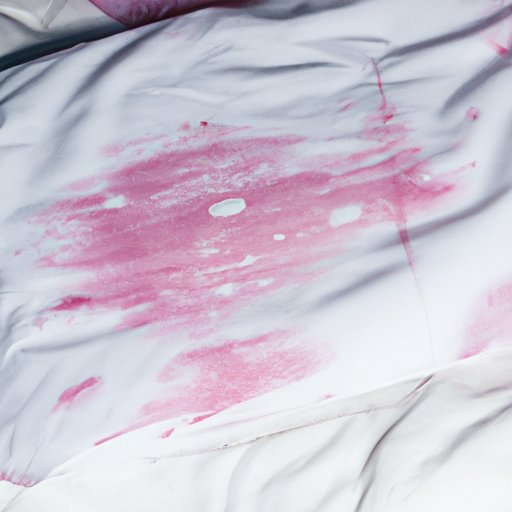
Introduction
Every menstruating individual has been there – waking up to find an unwelcome stain on their sheets. While period blood stains can be frustrating to deal with, there are several effective methods to remove them. This article is aimed at providing a comprehensive guide to removing period blood out of sheets, with step-by-step instructions, benefits and potential drawbacks of each method, and recommendations for selecting the best approach.
Using Salt
One of the simplest and most affordable methods for removing period blood out of sheets is using salt. It works especially well for fresh stains and requires only a few materials.
To start, mix a tablespoon of salt in two cups of cold water (hot water can set the blood stain). Soak the affected area in the solution for several hours or overnight. Afterward, rinse the sheet with cold water and toss it in the wash as you normally would.
One potential drawback of the salt method is that it may not be effective for older or set-in stains. Additionally, it may not be the best option for more delicate fabrics.
Hydrogen Peroxide
Hydrogen peroxide can be a powerful tool in removing period blood stains. However, it’s essential to handle it with care as it can bleach fabric.
To use hydrogen peroxide to get period blood out of sheets, dampen the affected area with cold water, apply a small amount of hydrogen peroxide, and let it sit for five to ten minutes. Watch the stain carefully as it fades. Once the stain starts disappearing, rinse the area with cold water and wash the sheet.
The downside of using hydrogen peroxide to remove stains is that it can only be effective on white fabrics and some light-colored materials. Always do a spot test on colored fabrics to ensure no damage or bleaching occurs.
Baking Soda
Baking soda is another popular method for removing period blood stains. It acts as a natural bleaching agent and can break down protein-based stains.
To use baking soda, mix a small amount of water with baking soda to create a paste. Apply the paste on the stain, let it sit for thirty minutes, then rinse with cold water. You can also let it sit overnight for more stubborn stains before rinsing and washing the sheet.
The advantage of using baking soda is that it’s safe for most fabrics and can be used on both white and colored sheets. However, it may not be as effective for very old or set-in stains.
White Vinegar
White vinegar is another popular home remedy for removing period blood stains. The acidic properties of vinegar can help break down the stain and reduce any lingering odors.
To use white vinegar, mix equal parts warm water and vinegar, then soak the affected area for thirty minutes. Rinse the sheet with cold water and toss it in the wash.
One potential issue with using white vinegar is that it can generally cause a significant smell. This smell can be easily reduced by washing the sheet with detergent and baking soda.
Lemon Juice
Lemon juice is a natural bleaching agent that can break down period blood stains. However, as with using hydrogen peroxide, it should be used with caution on colored or delicate fabrics.
To use lemon juice, dampen the affected area with cold water, then squeeze fresh lemon juice onto the stain. Let it sit for five to ten minutes, rinse the area with cold water, then wash the sheet as usual.
The benefit of using lemon juice is that it can be useful for both fresh and older stains. However, its bleach-like properties make it unsuitable for some fabrics.
Enzyme Cleaners
Enzyme cleaners are designed explicitly for removing protein-based stains like those found in period blood. They contain enzymes that break down the proteins into smaller pieces, making them easier to remove.
To use enzyme cleaners, apply the cleaner generously to the affected area and let it sit for the recommended amount of time. Scrub the area with a soft brush, then wash the sheet as usual.
The advantage of using enzyme cleaners is that they are safe for use on most fabrics. However, they can be pricier than other methods and may not be as effective on very old or set-in stains.
Conclusion
Removing period blood out of sheets can be a frustrating process. However, with these effective methods, you don’t have to throw out stained sheets or bedding anymore. Before using any method, always remember to test a small area of the affected fabric to make sure that you are not causing further damage.
Final Recommendations and Tips for Dealing with Period Stains on Sheets
– Always use cold water when treating period blood stains to avoid heat-setting the stain.
– Treat period blood stains as soon as possible to prevent them from setting in.
– When washing period-stained sheets, use a cold wash setting and gentle detergent.
– Use extra care and attention when washing sheets with period blood stains.




